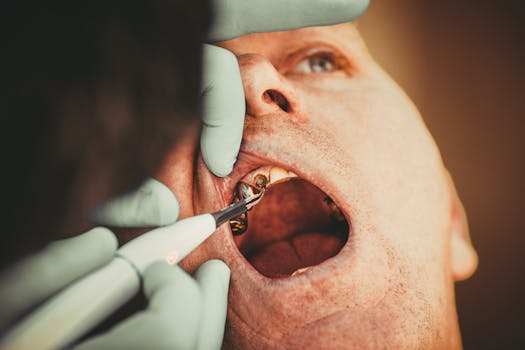How our teeth deal with stress
Have you ever wondered how everyday life's pressure and stress hormones affect your oral health issues? Whether we're nibbling too hard on a pretzel or clenching our teeth in our sleep, our teeth are constantly under physical stress. But what exactly happens in our mouths when it comes to dealing with this constant stress? Read on to find out more! We'll talk about how healthy oral habits can help keep your teeth strong despite the extra wear and tear and give you tips on how to reduce the daily damage caused by stress. Whether you want to take better care of your teeth or just need a refresher course in proper dental hygiene, you'll find everything you need in this blog post!



How our teeth cope with stress
We often take our teeth for granted, but research has uncovered some amazing insights into how our mouths are so adept at handling power. From biting into a big juicy burger to chewing gum and eating crunchy foods, we put our teeth under significant stress every day. But the remarkable science behind these processes shows that our oral health is stronger than we think. Our teeth are made up of special materials like dentin and tooth enamel, which together form an incredibly tough material that can withstand stress without cracking or breaking. And these layers don't just allow us to bite through hard substances - our jaws automatically adjust their strength to apply the right amount of pressure depending on what kind of food we're eating.
Effects of stress
We all face stress, but it can have a powerful impact on our physical and mental health. This is also true for our oral health! Stress-related dental problems can range from frequent headaches and jaw pain to weakening of the teeth, to grinding or clenching of the teeth during sleep. Chronic stress can cause saliva production to become unbalanced, leading to poor oral hygiene. This causes a build-up of bacteria and an increased risk of tooth sensitivity and tooth decay and, in the worst cases, tooth loss. In addition, stress leads us to turn to unhealthy eating habits, such as the overconsumption of sugary snacks as an emotional outlet, which also contributes to dental problems. If you keep an eye on your mental health care and learn to recognise symptoms of stress, you'll be well on your way to taking care of your teeth!
What happens when you grind your teeth?
Grinding your teeth in stressful situations or while sleeping can cause wear and tear on your molars. The constant rubbing and grinding of the teeth can cause the enamel to wear away, which can lead to a decrease in the size and height of the teeth. When the enamel is worn away, sensitive areas in the tooth can also become exposed, leading to pain and sensitivity.
In more severe cases of teeth grinding, also called bruxism, damage can also occur to the jaw joint. This can lead to pain, stiffness and even difficulty chewing. In the worst cases, advanced wear of the molars can also lead to problems with jaw alignment, which in turn can lead to poorer chewing and speaking function. It is therefore essential to treat bruxism and prevent wear of the molars.
Prevention is key
Taking time for self-care and teeth is important all around, but especially a necessity in stressful times. It may seem difficult to remember all the tips and tricks for keeping your teeth healthy when life demands so much of us, but if you stick to it, it will help you in the long run. Prevention is key - brushing your teeth regularly and visiting our Studio every six months can prevent many potential dental health problems. So don't delay - take some time every day for preventative dental care and ensure your smile stays bright, no matter what obstacles are put in your way!


Regular professional dental cleaning is essential for a healthy mouth and beautiful teeth. Our specialized staff identifies signs of cavities early and prevents them.
- Personalised treatment
- Gum check & caries control
- Painless cleaning with AIRFLOW
Common symptoms of stress-related dental problems
Dealing with stress can feel overwhelming, and unfortunately, it can also affect your dental health. If you're feeling particularly stressed and having problems with your teeth, there are some common symptoms to look out for. Here is a list of ways stress affects your overall health:
- Toothache
- TMJ (temporomandibular joint) pain
- Bad breath
- Pain in the jaw muscles
- Tension in the chewing muscles
- Inflammation of the periodontium (periodontitis)
- Tension of the facial muscles
- Inflammation of the gums (gingivitis)
- Increased jaw clenching
- Frequent headaches
These dental problems can range from mild to very severe. In addition, people with high levels of stress often forget to take care of their oral hygiene as well, which can lead to deterioration of the tooth structure.
Mouth ulcers
Mouth ulcers, sometimes called aphthous ulcers, are uncomfortable sores that form in the oral tissues. Although the exact cause is not yet known, there is evidence that stress increases the likelihood of mouth ulcers developing. It is thought that ulcers are caused by the immune system attacking the oral mucosa and breaking down the tissue. Canker sores usually disappear on their own within 10 to 14 days, but can be very painful and uncomfortable during this time. a canker sore can occur on the cheek, on the inside of the lip, on or under the tongue, or on the soft palate during periods of heavy stress. This is more likely if you brush too hard, eat hot or acidic meals, or suffer a minor injury in the mouth, such as an accidental bite to the cheek. It is advisable to find ways to reduce stress so that your oral health is not affected by an oral ulcer. You can apply a numbing agent such as Orajel or a similar over-the-counter medication when a mouth ulcer develops. Saltwater rinses can also help relieve pain and inflammation.
Dry mouth
Xerostomia, or dry mouth, is caused by decreased salivation. According to research, stress, anxiety, and depression can cause your salivary glands to produce less, which can result in a dry mouth. When feeling stressed, many people may breathe through their mouths, which can further dry up oral tissues. Although having a dry mouth may not seem like a big deal, producing adequate saliva is crucial for maintaining good dental health. Enough saliva helps to prevent cavities and gingivitis by cleaning out the bacteria and food particles in your mouth. As a result of a dry mouth, bacteria and food particles might remain in your mouth and on your teeth. This can dramatically raise your risk for tooth decay and cavities.
Increasing saliva production by consuming lots of water is one technique to treat dry mouth. A non-alcoholic mouthwash rinse can also assist in reducing dry mouth. See your dentist if your dry mouth persists after your stressful time is past so they can determine the cause, offer the best treatment, and take steps to prevent tooth decay.
Natural remedies to relieve stress
If your busy schedule has you grinding your teeth and clenching your jaw, it's time to explore some natural remedies that can put an end to the pain. Before resorting to a dental treatment method, take a gentler approach with natural remedies such as relaxation techniques, massage and aromatherapy Relaxation exercises help reduce chronic tension headaches associated with jaw pain. Massages can help by relieving tension in the muscles. And a few drops of lavender oil or another aromatic oil may be enough to soothe the affected area. Try these natural methods, drink plenty of water and stretch regularly - they work wonders!
When should you see a dentist?
Stress can take a toll on our bodies, and oral health is no exception. To maintain healthy teeth and gums, it's important to see a dentist or dental professional when you notice signs of stressed dental problems. These can include teeth grinding (bruxism), gum disease, and tension in the jaw or neck. If you find it difficult to manage your stress at home or in the office, it may also be helpful to make an appointment with your dentist to discuss relaxation techniques that you can use. Bite splints or a night guard can help if you grind your teeth. They also protect not only your natural teeth but also any dentures, implants and fillings. It is also advisable to have an oral health checkup on a regular basis to keep an eye on any subsequent damage.
And don't forget: good dental hygiene habits - such as brushing and flossing - are not only helpful for a healthy mouth but can also help reduce feelings of stress.


Not sure about the health of your mouth? Thanks to our innovative intra-oral camera, we can give you a detailed overview and offer you the best possible individual routine.
- We check your oral health and hygiene
- Checking your teeth for cavities
- Composition of an individual routine



